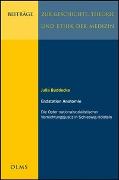- Start
- Endstation Anatomie
Endstation Anatomie
Angebote / Angebote:
Warum fiel gerade in Kiel, insbesondere in der Medizinischen Fakultät, das national-sozialistische Gedankengut auf fruchtbaren Boden? Unter Berücksichtigung des historischen Kontextes beschäftigt sich die Arbeit u.a. mit der Leichenakquisition des Anatomischen Instituts und versucht, durch authentische Lebensgeschichten, die mehr Interesse und Betroffenheit auslösen als Zahlen und Fakten, drei Hingerichteten ein Gesicht zu geben. Differenziert wird zwischen Verbrechen jener Anatomen, die im Dienst des Regimes zu Mördern wurden, und dem Verhalten reiner Nutznießer und Opportunisten, die sich zwar nicht an der aktiven Vernichtung von Menschen beteiligten, aber Unrecht stillschweigend in Kauf nahmen. Als Kontrast dazu dienen Beispiele von Medizinstudenten, die sich allen Gefahren zum Trotz dem hippokratischen Eid verpflichtet fühlten und dies mit dem Leben bezahlten. Aktualität gewinnt die Thematik trotz der Fülle anderer Untersuchungen zur Rolle der Medizin im Dritten Reich insbesondere deshalb, weil der Arzt heute wie damals einer schmalen Gratwanderung zwischen reiner Empathie und kühler Sachlichkeit bis hin zur Verdinglichung des Patienten ausgesetzt ist und dabei an ethische Grenzen stößt.
***
Why did National Socialist ideas fall on such fertile ground in Kiel, and especially in the Faculty of Medicine? Taking into account the historical context, this study examines, among other topics, the acquisition of corpses by the Institute of Anatomy, and attempts, by using authentic life-stories, which arouse more interest and more shock than mere facts and figures, to give a face to three victims of execution. The study differentiates between the crimes of those anatomists who became murderers in the service of the regime and the behaviour of beneficiaries and opportunists who, while not active participants in the destruction of human life, nonetheless accepted injustice without speaking out. In contrast there are examples of medical students who felt bound by the Hippocratic Oath in spite of the risks, and who paid for this with their lives. Despite the large number of works on the role of medicine in the Third Reich, this study is particularly topical because doctors today, as then, have to tread a fine line between pure empathy and cool objectivity to the point of the objectification of the patient, and in the process come up against ethical boundaries.
Lieferbar in ca. 5-10 Arbeitstagen
